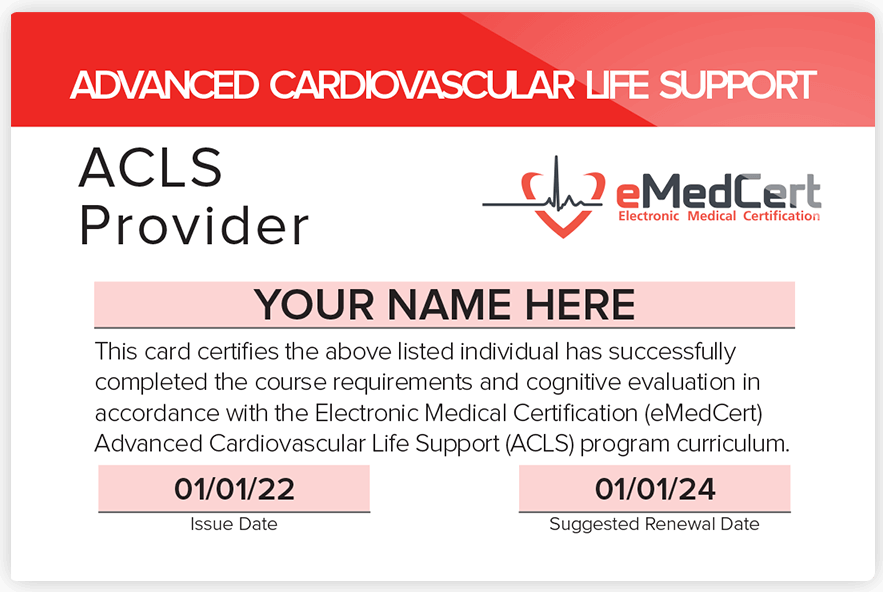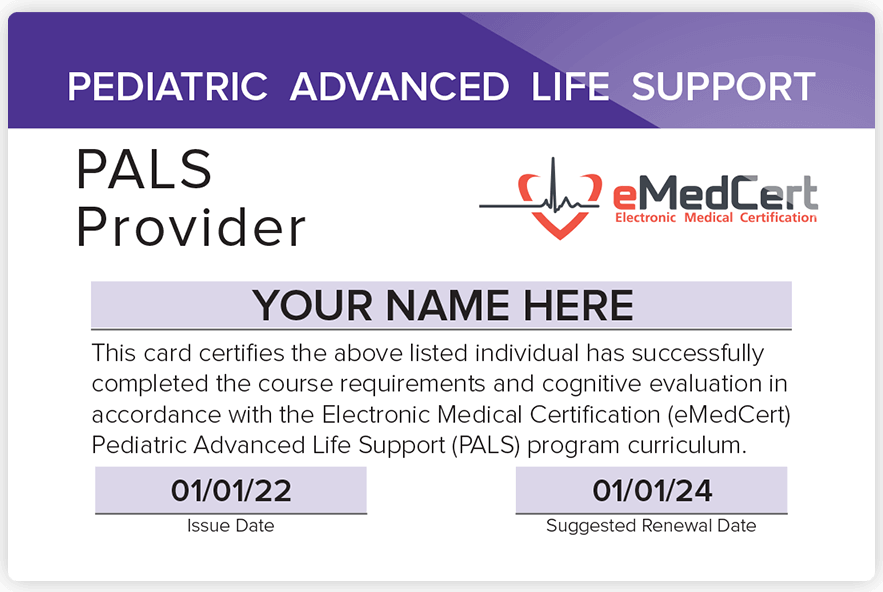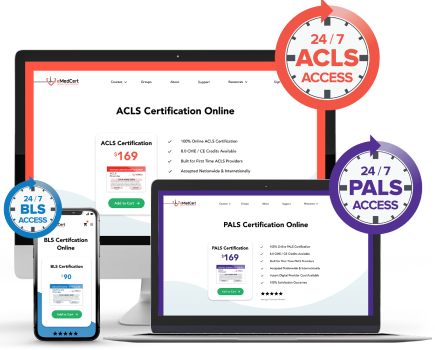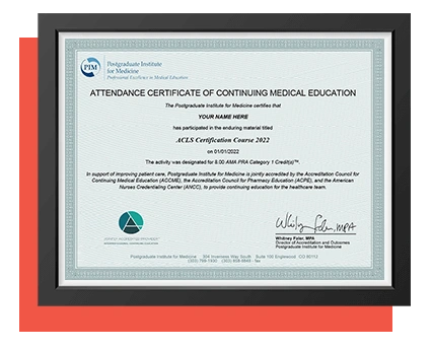ACLS and PALS Certification
ACLS Recertification

PALS Recertification


The Efficient, Affordable Way to Certify
eMedCert's Online ACLS (Advanced Cardiac Life Support) and PALS (Pediatric Advanced Life Support) Recertification courses are built specifically for the demanding lifestyle required of 21st-century medical students and healthcare professionals. Our 100% online courses give you control of your ACLS and PALS Certifications — take them when you want, where you want, and at your own pace. Complete your courses efficiently from your desktop, tablet, or smartphone.
Credible and Affordable ACLS and PALS Certifications
Our ACLS and PALS training is accredited through our partnership with the Postgraduate Institute for Medicine (PIM) and also by the California Board of Registered Nursing (CA BRN). We provide AMA, ANCC, ACPE, and ADA continuing education credits, redeemable upon completion of the ACLS and PALS Recertification courses.
eMedCert and our ACLS and PALS material undergo routine audits by regulatory organizations and 3rd-party clinical teams. Our internal medical team continuously works to ensure compliance, accuracy, and integrity.

Ready To Begin?
Complete your registration and begin reviewing your material in less than two minutes. Certification has never been this easy!
Online ACLS Recertification Details
Our ACLS Recertification course is designed to deliver the best online certification experience that can accompany your busy schedule.
- Start When Ready -- No Time Limit -- Available 24/7
- Finish in a Single Sitting or Save Your Progress and Return Later
- Achieve a Passing Score –– 80% or Higher (32 Correct / 40 Total Questions)
- Instant Exam Results & Unlimited Exam Retakes
- No On-Site Skills Check Required
- Digital ACLS Provider Card Available Immediately for Download
- 4.0 AMA, ANCC, ACPE or ADA CME Credits Available
Online PALS Recertification Details
Our PALS Recertification course is designed to deliver the best online certification experience that can accompany your busy schedule.
- Start When Ready -- No Time Limit -- Available 24/7
- Finish in a Single Sitting or Save Your Progress and Return Later
- Achieve a Passing Score –– 80% or Higher (32 Correct / 40 Total Questions)
- Instant Exam Results & Unlimited Exam Retakes
- No On-Site Skills Check Required
- Digital PALS Provider Card Available Immediately for Download
- 4.0 AMA, ANCC, ACPE or ADA CME Credits Available
Trusted By:





ACLS and PALS Certification
Advanced Cardiovascular Life Support (ACLS) and Pediatric Advanced Life Support (PALS) are two essential skills in healthcare. Equipping yourself with PALS and ACLS certifications establishes trust with patients, assuring them that you have received the specialized skills for handling time-sensitive situations.
The internet age has made it increasingly convenient to obtain ACLS and PALS certification online through a fuss-free registration process. These specialized certifications can help improve the careers of nurses and healthcare practitioners working within in-hospital, pre-hospital, and out-of-hospital medical facilities. While ACLS and PALS may seem similar at first sight, they have differences in terms of the type of patients involved.
Related Article: ACLS vs. PALS
What Is ACLS Certification for Nurses and Other Healthcare Providers?
ACLS certification is an evidence-based course that provides nurses and healthcare providers with the necessary information and skills to respond to cardiac emergencies efficiently. These medical emergencies always require quick and effective decision-making in managing life-threatening conditions. As such, an ACLS certification course prepares participants with the know-how in handling various cardiac-related conditions like:
- Stroke
- Myocardial infarction
- Acute coronary syndromes
- Coronary artery diseases
- Cardiomyopathy
Individuals with ACLS qualifications also have the skills to provide specialized care after the return of spontaneous circulation (ROSC) during a resuscitation effort.
Understanding the Difference Between PALS and ACLS
Healthcare experts developed the ACLS and PALS certifications to improve nursing and healthcare emergency responses. They cater to different scenarios and target patients. These courses also share many similarities, such as building upon a foundation of skills developed during a Basic Life Support (BLS) certification course. The courses would also guide learners through skills and proficiencies in defibrillation, collaborative communication under high-stress scenarios, and post-resuscitation treatment.
ACLS Course Expectations
An ACLS class caters to the adult population by strategically responding to different cardiac episodes. These include cardiovascular conditions that primarily affect adult patients, like coronary artery diseases that cause blockages in blood flow to the heart. Qualified ACLS practitioners would also clearly understand the types of medicine commonly prescribed to these patients. Practical ACLS skills may include CPR, administering ACLS drugs like epinephrine in response to cardiac arrest, and airway management techniques.
What to Expect With PALS Certification
PALS certification focuses on pediatric-related heart conditions. As such, the medical skills and knowledge taught in the course cater to a younger patient demographic, typically up to 8 years of age. As such, PALS-certified practitioners receive the necessary training for effectively responding to pediatric-related cardiac emergencies.
In terms of practice, PALS provides learners with the knowledge to administer proper treatment drugs suitable for younger patients. A PALS class also requires learners to grasp the specialized care precautions tailored to the physiology and anatomy of younger patients.
PALS ACLS Integration
While ACLS and PALS certifications differ, many nursing and healthcare practitioners often integrate them for an all-rounded approach to emergency response. Doing so also improves team dynamics across multiple scenarios, enabling individuals to think critically and solve problems for the best patient outcomes.
Learners can optimize their PALS and ACLS training by accessing websites that offer ACLS and PALS certification online courses. The flexibility of getting certified remotely provides learners with a comfortable learning pace (balancing course schedules with work hours) and interactive context to perform in the most time-sensitive and demanding settings.
ACLS Certification
ACLS certification provides nursing and healthcare professionals with the specialized practices and knowledge for efficiently responding to cardiac emergencies involving adult patients. The course also equips individuals with the confidence and team dynamics to deliver optimal care during these time-sensitive situations.
Through ACLS certification, healthcare practitioners can:
- Advance their careers in cardiac-related fields
- Demonstrate competency in emergency scenarios for improved patient outcomes
- Follow the proper protocols in standardized patient care for consistent and reliable treatments
- Obtain continuing medical education (CME) credits
ACLS Certification Online
The online certification approach enables learners to follow a more flexible course schedule. Because the courses are self-guided and delivered entirely online, the time it takes to complete an online ACLS course varies according to an individual's professional experience.
An ACLS class online also takes on a primarily self-directed approach to ACLS mastery, guiding candidates through a course that includes text, illustrations, ACLS algorithms, an ACLS pretest, an ACLS study guide, and more. ACLS learners can also purchase additional course materials to help them better prepare for the certification tests.
ACLS Qualifications And Renewal
ACLS applicants typically have professional experience working in a healthcare environment and oftentimes are even required to have a BLS certification as well. Upon course completion, it is crucial to know how to renew ACLS by taking an ACLS recertification course every two years.
Many educators may offer online and on-premise options for ACLS renewal. Online ACLS renews usually involve reading the ACLS course material and completing assignments that assess emergency response proficiencies.
Other ACLS Renew Considerations
It is also necessary to ensure that you officially register your ACLS renewal details with your employer. Check that you have made the documented changes based on your ACLS certificate.
Regular updates to ACLS guidelines ensure that healthcare providers receive the latest information and skills for providing optimal care standards during time-sensitive cardiac episodes. Practicing megacode scenarios, reviewing medications and doses, and attempting ACLS practice tests can help streamline the renewal process.
Also, it is important to note that healthcare practitioners whose ACLS expired are still able to sign up for an ACLS renewal course - they are not required to take the initial ACLS certification course all over again. Having said that, some providers may still choose to retake the initial course to gain greater confidence in providing efficient ACLS skills in real-world settings.
PALS Certification
PALS certification provides healthcare practitioners with specialized emergency-response skills in caring for pediatric patients suffering from cardiac conditions. PALS-certified individuals would receive the skills and knowledge to handle the medical needs of infants and children during a cardiac episode, which includes:
- Airway management
- Shock recognition and management
- Applying specific algorithms in pediatric cardiac responses
- Administration of medication and dosage for younger patient demographics
A PALS certification course takes learners through multiple key areas in managing critical pediatric situations. These modules focus on various topics to give practitioners a deeper understanding of patient needs based on their characteristics and circumstances. PALS also extends to skills centered on non-cardiac-related conditions, such as breathing anomalies due to respiratory distress. These may include administering endotracheal intubation where required in response to respiratory symptoms.
What Is a PALS Certification?
Similar to the ACLS, candidates who complete a PALS course receive a PALS card that is valid for two years. Depending on their preferred approach and schedule, learners can also have blended and in-classroom lessons. PALS for nurses equips individuals with the necessary skills to administer life-saving treatments in cardiac emergencies.
PALS for nurses provides practical emergency response skills such as operating children's AEDs, administering infant CPR, and effectively interpreting and conveying the needs of younger children during cardiac distress. These certifications can prove vital for nurses stationed in pediatric healthcare facilities and time-sensitive environments like emergency rooms (ERs).
As such, PALS is usually an industry requirement for medical professionals working with infants and children. You need to score at least 80% to pass the PALS examination, which tests candidates on various topics in pediatric emergency response. eMedCert’s initial PALS program usually takes about 2-4 hours, while our PALS recertification program typically takes about 1-3 hours. However, these can vary drastically depending on a candidate's preferred learning pace.
As with ACLS, PALS certification offers multiple professional benefits like:
- Improved confidence in coping with pediatric-related emergencies
- Greater patient outcomes through systematic teamwork and practical expertise
- Career advancement by demonstrating competencies and proficiencies in specialized healthcare environments
- PALS continuing education (CE) credits
Online PALS Pathway
Online PALS training enables learners to access materials like e-manuals and diagrams that prepare them for the official PALS assessment. The blended approach also includes a hands-on component conducted in a classroom setting. However, this is not required for most online PALS courses. It is important to check the best practices for acquiring healthcare qualifications like PALS and ACLS with your employer. Some healthcare providers may request candidates to undergo in-person training for skills validation.
Renew PALS Online
You could renew PALS online (after the two-year validity) via trusted online PALS providers like eMedCert that offer a hassle-free process to renew PALS certification. PALS online renewal eliminates the need for skills assessments and provides a self-guided approach with 24/7 accessibility for updating your PALS certifications. These remote learning methods also include valuable course materials like downloadable PDFs and PALS pretests to significantly improve your chances of qualifying within a single sitting.